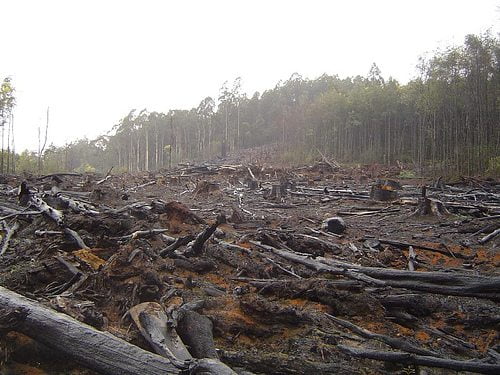

Environment
Consumer demand drives illegal deforestation – report
Demand for commodities such as palm oil, animal feed and timber has caused 71% of tropical deforestation for agriculture between 2000 and 2012, 49% of which was done illegally.
Blue & Green Tomorrow is currently running a crowdfunder to ensure its survival. Please pledge.
Consumer demand from the EU, China, India, Russia and the US worth around $61 billion (£38bn) a year has caused the clearance of more than 200,000 sq km of forest, a new report by US-based NGO Forest Trends has found.
The report, Consumer goods and deforestation, revealed that of all deforestation occurring during the period, 49% of it was caused by illegal conversion for commercial agriculture.
The countries most heavily affected by the phenomenon have been Brazil and Indonesia, accounting for 75% of the illegally cleared area. They are both being heavily cultivated for palm oil, soy used for animal feed and wood.
In the Amazon and Indonesia, experts have estimated that 90% and 80% of deforestation respectively happens illegally.
Deforestation does not only devastate the ecosystem, by reducing biodiversity, but also local communities that rely on the forest for their need. Since forests also play a crucial role in capturing carbon dioxide, the organisation has estimated the wiping out of forest released 1.47 gigatonnes of carbon each year.
Michael Jenkins, the president and CEO of Forest Trends, commented, “We’ve known that the production of agricultural commodities is a principal driving force behind deforestation, but this is the first report to show the outsize role that illegal activities play in the production of hundreds of food and household products consumed worldwide.
“Urgent action is needed to help countries where these agricultural products are being grown, both for governments to enforce their own laws and regulations, and for businesses aiming to produce commodities legally and sustainably.”
A separate study published in June suggested that by minimising deforestation, global carbon emissions could be cut by one-fifth.
Photo: crustmania via Flickr
Further reading:
NASA probe to study world’s forests and carbon cycle
World must cut meat consumption to prevent climate change and food insecurity
European Union still failing to control illegal timber trade, says WWF
Clearing of Amazon rainforest for agriculture emits 54 million tons of carbon per year
Ending deforestation would cut global emissions by one-fifth


 Environment11 months ago
Environment11 months agoAre Polymer Banknotes: an Eco-Friendly Trend or a Groundswell?

 Features10 months ago
Features10 months agoEco-Friendly Cryptocurrencies: Sustainable Investment Choices

 Features11 months ago
Features11 months agoEco-Friendly Crypto Traders Must Find the Right Exchange

 Energy10 months ago
Energy10 months agoThe Growing Role of Solar Panels in Ireland’s Energy Future






























